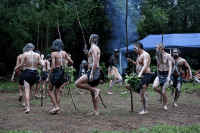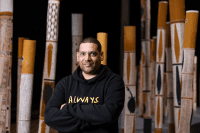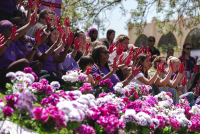The development of a Kimberley Aboriginal mud crab fishery has taken a significant step forward, with plans to expand surveys of mud crab populations across the region. This initiative is a collaboration between the Western Australian (WA) government and Traditional Owners, combining cultural knowledge with western scientific methods. Kimberley Aboriginal Mud Crab Fishery Moves Forward with Expanded Surveys
Mud crabs have been identified as a key species of interest for Traditional Owners throughout the Kimberley. However, comprehensive information on their biology, species distribution, and abundance is essential to develop sustainable management practices and appropriate trap allocations.
Building on Previous Success
The expanded mud crab surveys build on a three-year project funded by the Australian government’s Fisheries Research and Development Corporation. This project aims to create a sustainable fishery that benefits local communities economically and culturally.
In 2022, a pilot survey conducted by the WA Department of Primary Industries and Regional Development (DPIRD) alongside Madanaa Nada community members collected baseline data on mud crab populations in Derby’s King Sound. This initial survey also tested various data collection techniques. Following this, a survey in Cambridge Gulf engaged local Balanggarra and Miriuwung Gajerrong rangers, further refining methods and expanding the knowledge base.
Community and Government Support
Kimberley MLA Divina D’Anna expressed strong support for the project, emphasizing its foundation on years of efforts by Traditional Owners to establish a Kimberley Aboriginal mud crab fishery.
“Increased research participation and collaboration with Indigenous groups will build a shared knowledge of local fisheries for sustainably developing economic opportunities on Country,” D’Anna stated.
The positive outcomes of these initial surveys have sparked growing interest from numerous Aboriginal communities across the Kimberley, prompting plans for additional mud crab surveys. King Sound and Cambridge Gulf will be re-surveyed, and new surveys are planned in collaboration with the Nyul Nyul and Karajarri communities. There is also potential for involvement from other Aboriginal communities in future projects.
Training and Sustainability
The WA government is exploring formal training programs for rangers in scientific data collection methods. These programs aim to ensure the long-term management and sustainability of the mud crab fishery, equipping local communities with the skills needed to maintain this vital resource.
WA Fisheries and Regional Development Minister Don Punch praised the growing interest from Kimberley Traditional Owners, highlighting the potential for an Aboriginal mud crab fishery to create new and diversified enterprises across the region.
“The surveys carried out to date have provided a great opportunity to test data collection methods and exchange local cultural knowledge and western science,” Punch said.
Looking Forward
The collaboration between the WA government and Traditional Owners marks a significant milestone in developing a sustainable and economically beneficial mud crab fishery in the Kimberley. As surveys expand and more communities become involved, the project stands to strengthen local economies and preserve cultural traditions, ensuring the long-term health of mud crab populations in the region.
The National Indigenous Cultural Centre (NICC) is an Indigenous home.
We provide Indigenous products, music, art and news.
If you want Indigenous gifts and merchandise, bush tucker food at your next event or Indigenous entertainment at your next party, expo or conference, feel free to contact us!
Visit our page: https://nicc.org.au/
Tony Clemenger.
Chief Executive Officer.
Tel: 0419431649.
Level 1 397 Chapel Street South Yarra 3141.








